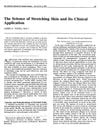 3 citations,
January 2011 in “Female pelvic medicine & reconstructive surgery”
3 citations,
January 2011 in “Female pelvic medicine & reconstructive surgery” Hormones significantly affect women's sexual function, and more research is needed to improve treatments for sexual dysfunction with minimal side effects.
January 2015 in “Georg Thieme Verlag eBooks” Chemical peeling and dermabrasion improve skin texture and appearance when done correctly.
 45 citations,
August 2013 in “Facial Plastic Surgery Clinics of North America”
45 citations,
August 2013 in “Facial Plastic Surgery Clinics of North America” Using sharp tools and the right techniques in hair transplant surgery leads to less damage to hair follicles.
 41 citations,
December 2008 in “Current Opinion in Ophthalmology”
41 citations,
December 2008 in “Current Opinion in Ophthalmology” Certain eye surgery complications can be managed effectively, especially in patients who have used specific prostate medications.
 28 citations,
January 2006 in “Journal of agricultural safety and health”
28 citations,
January 2006 in “Journal of agricultural safety and health” Most Latino farmworkers in the study had skin diseases, with fungal infections being the most common.
 6 citations,
August 2007 in “Journal of Surgical Research”
6 citations,
August 2007 in “Journal of Surgical Research” Mice genetically modified to produce more Del1 protein had faster hair regrowth.
 125 citations,
January 1999 in “Drugs”
125 citations,
January 1999 in “Drugs” Finasteride effectively treats baldness but may cause sexual side effects.
 28 citations,
October 2013 in “Cornea”
28 citations,
October 2013 in “Cornea” Scientists have made progress in creating replacement teeth, hair, and glands that work, which could lead to new treatments for missing teeth, baldness, and dryness conditions.
 23 citations,
March 2001 in “Clinics in Dermatology”
23 citations,
March 2001 in “Clinics in Dermatology” Hair restoration surgery techniques have evolved, with focus on patient selection and realistic goals, and future advancements may include cloning and gene therapy.
 22 citations,
March 2018 in “American Journal of Clinical Dermatology”
22 citations,
March 2018 in “American Journal of Clinical Dermatology” New acne treatments show promise as alternatives to traditional therapies.
 13 citations,
October 1993 in “International Journal of Dermatology”
13 citations,
October 1993 in “International Journal of Dermatology” Minoxidil effectively promotes hair regrowth in younger patients with small balding areas.
 11 citations,
June 2012 in “Human Reproduction Update”
11 citations,
June 2012 in “Human Reproduction Update” The conclusion is that there is a high demand for new contraceptives that provide both pregnancy prevention and protection against STIs, along with additional health benefits.
 3 citations,
January 2007 in “Elsevier eBooks”
3 citations,
January 2007 in “Elsevier eBooks” The document concludes that individualized treatment and lifestyle changes are important for managing menopause symptoms and health risks.
 1 citations,
December 2023 in “Annals of Phytomedicine An International Journal”
1 citations,
December 2023 in “Annals of Phytomedicine An International Journal” Nanoemulgel improves delivery and effectiveness of plant-based drugs for various conditions.
 1 citations,
November 2018 in “Elsevier eBooks”
1 citations,
November 2018 in “Elsevier eBooks” The document concludes that transplantology has evolved with improved techniques and materials, making transplants more successful and expanding the types of transplants possible.
 January 2019 in “Research & Reviews: Journal of Pharmaceutics and Nanotechnology”
January 2019 in “Research & Reviews: Journal of Pharmaceutics and Nanotechnology” Nanotechnology can effectively deliver antimicrobial peptides for treating infections.
 90 citations,
December 2007 in “Current Oncology”
90 citations,
December 2007 in “Current Oncology” Non-hormonal treatments should be used first for sexual dysfunction in postmenopausal breast cancer patients on aromatase inhibitors, with hormones as a second option.
 1 citations,
December 2022 in “Actas dermo-sifiliográficas/Actas dermo-sifiliográficas”
1 citations,
December 2022 in “Actas dermo-sifiliográficas/Actas dermo-sifiliográficas” Sensitive scalp causes discomfort and hair loss, treated with personalized care.
 January 2024 in “Annals of Dermatology”
January 2024 in “Annals of Dermatology” Hair transplants are highly satisfactory for treating female-pattern hair loss.
 108 citations,
August 2017 in “Clinical, Cosmetic and Investigational Dermatology”
108 citations,
August 2017 in “Clinical, Cosmetic and Investigational Dermatology” Microneedling is promising for treating various skin issues but needs more research to confirm its effectiveness and safety.
19 citations,
November 2014 in “Journal of Comparative Physiology A” Spider joint hair sensilla are adapted to sense movement during walking.
 27 citations,
January 2008 in “Journal of Cutaneous and Aesthetic Surgery”
27 citations,
January 2008 in “Journal of Cutaneous and Aesthetic Surgery” Modern hair restoration techniques have evolved from punch grafting to methods like micro-grafting and follicular unit transplantation, but they are labor-intensive, expensive, and can lead to patient dissatisfaction. Future treatments may involve cloned hair follicles and drugs like finasteride.
 January 2025 in “Medicina”
January 2025 in “Medicina” Advanced techniques and technologies can improve burn wound healing, but more research is needed.
 316 citations,
June 2017 in “Stem Cell Research & Therapy”
316 citations,
June 2017 in “Stem Cell Research & Therapy” Fat tissue-derived cells show promise for repairing body tissues, but more research and regulation are needed for safe use.
 3 citations,
September 2019 in “Journal of Orthodontics”
3 citations,
September 2019 in “Journal of Orthodontics” A boy's hair grew back after he stopped using orthodontic headgear that caused temporary hair loss.
 June 1997 in “The American Journal of Cosmetic Surgery”
June 1997 in “The American Journal of Cosmetic Surgery” Understanding the science of skin stretching is crucial for safe and effective hair replacement techniques.
 8 citations,
January 2023 in “Biosensors”
8 citations,
January 2023 in “Biosensors” Piezoelectric Nanogenerators are promising for non-invasive health monitoring but need efficiency and durability improvements.
February 2023 in “Medicine in novel technology and devices” Microneedles with traditional Chinese medicine can help regrow hair in androgenic alopecia.
 140 citations,
August 2011 in “Biomaterials”
140 citations,
August 2011 in “Biomaterials” Keratose, derived from human hair, is a non-toxic biomaterial good for tissue regeneration and integrates well with body tissues.
 86 citations,
June 2017 in “Stem cell investigation”
86 citations,
June 2017 in “Stem cell investigation” Stem cells from hair follicles can safely treat hair loss.



























